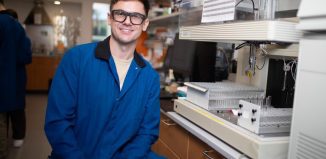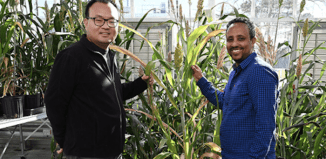SBU’s Bingham and Zachar develop Trojan horse for Cancer
Paul Bingham and Zuzana Zachar, a husband-and-wife team at Stony Brook University, have spent the better part of a decade exploring a way to disrupt cancer’s energy supply line.
They have developed a compound that takes advantage of the different way cancer cells produce energy. With the help of other scientists at Stony Brook, including James Marecek in the Chemistry Department, they created another form of lipoate, called CPI-613, that doesn’t foster cancer growth.
“It’s like a Trojan horse,” explained Zachar, who is an assistant professor in the Department of Biochemistry and Cell Biology. “It has no catalytic ability,” which means that it looks like a key molecule for a cancer pathway in mitochondria, but doesn’t act like it.
By shutting down tumor cell mitochondria, the researchers are able to trigger several cell-death pathways selectively, explained Bingham, who is an associate professor in the same department. The scientists anticipate lower vulnerability to evolved resistance because the CPI-613 attacks two enzyme targets at the same time.
The Stony Brook team are in Phase II trials of this drug at Wake Forest University with patients who have leukemia and lymphoma.
“We saw a 38 percent response rate [among patients who were not responding to other therapies] in the first Phase I trial we completed” said Timothy Pardee, an assistant professor who conducted those trials and is performing a similar function in Phase II. While he believes the treatment has extended people’s lives, he cautioned that “it’s important to remember that these are very early results.”
The scientists have to generate significant evidence to be confident in their approach, both for basic science and for use with patients, Bingham said.
Even though the treatment has shown promise, it’s possible that cancers may respond to this approach the way they have to so many other treatments, by finding another way to avoid selective eradication. While the treatment the couple has worked on is designed to minimize this risk, they will only know whether they have been successful after extensive testing.
“Until we get more clinical experience, we can’t know that natural selection operating on cancer cells doesn’t have a diabolical trick we haven’t thought about,” Bingham said.
Robert Haltiwanger, the chairman of the Department of Biochemistry and Cell Biology, said scientists had known since the 1930’s that the metabolism of cancer cells is different from that of normal cells. Bingham and Zachar have developed a compound that “seems to have an effect,” which means it has potential in a “wide variety of cancers.” In addition to contributing to cancer research, Bingham is also a “very popular lecturer,” said Haltiwanger.
Bingham and Zachar, who had done extensive work on the fruit fly Drosophila, began looking at cancer metabolism in the late 1990’s as a “side project.” That showed enough promise for them to transform it into a full-time pursuit.
Bingham grew up in the rural Midwest, attending high school in a small town in a farming area of central Illinois that produces corn and soybeans. He received his doctorate from Harvard University in the Department of Biochemistry and Molecular Biology.
Zachar was born in what is now the Czech Republic. She moved to Ghana, West Africa when she was 10 and emigrated to the United States in 1968, settling near Chicago, Ill. She was at the University of North Carolina, Chapel Hill and Bingham was at the National Institute of Environmental Health Sciences in North Carolina when they met.
“We didn’t grow up as clinical researchers,” Bingham said. “We came up as basic, fundamental” scientists who were “drawn later in our careers into clinical work. When I was told we were going to work with people, my first reaction was anxiety for fear of doing harm.”
The researchers, who are residents of South Setauket and have lived on Long Island for 32 years, love the hiking trails.
They expressed satisfaction at the prospect of contributing to an effort that might aid in cancer treatment. Bingham said the research has particular meaning for him.
His mother, Doris Rorhman Bingham, died of cancer when he was 16. “Had she lived another 10 or 20 years, my life would have been completely different,” he said. “I still think of her almost every day.”
Zachar said the couple feel fortunate to be able to do this kind of work., “Saving other families from what [Bingham’s] family went through would be supremely fulfilling,” she said.






